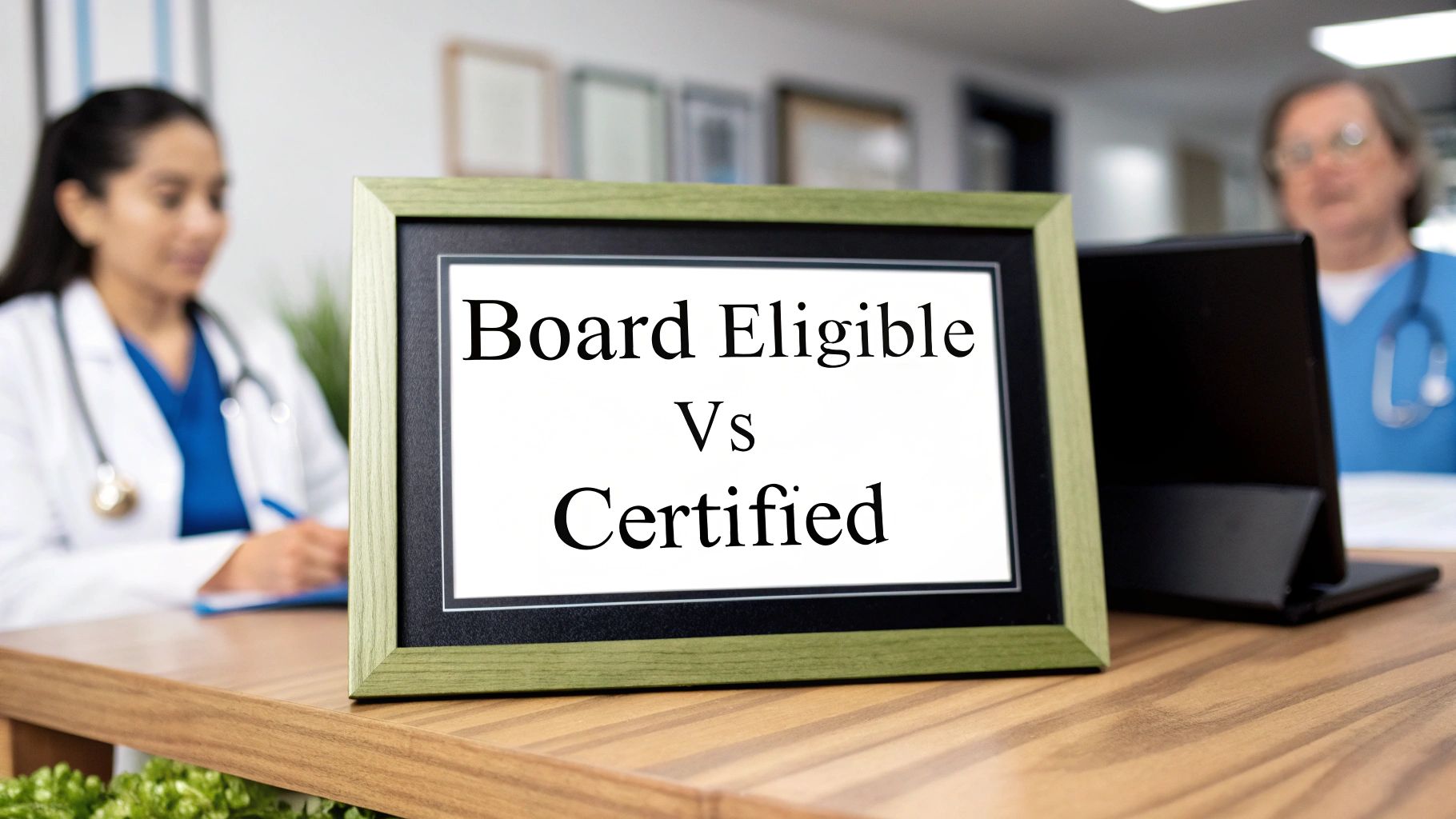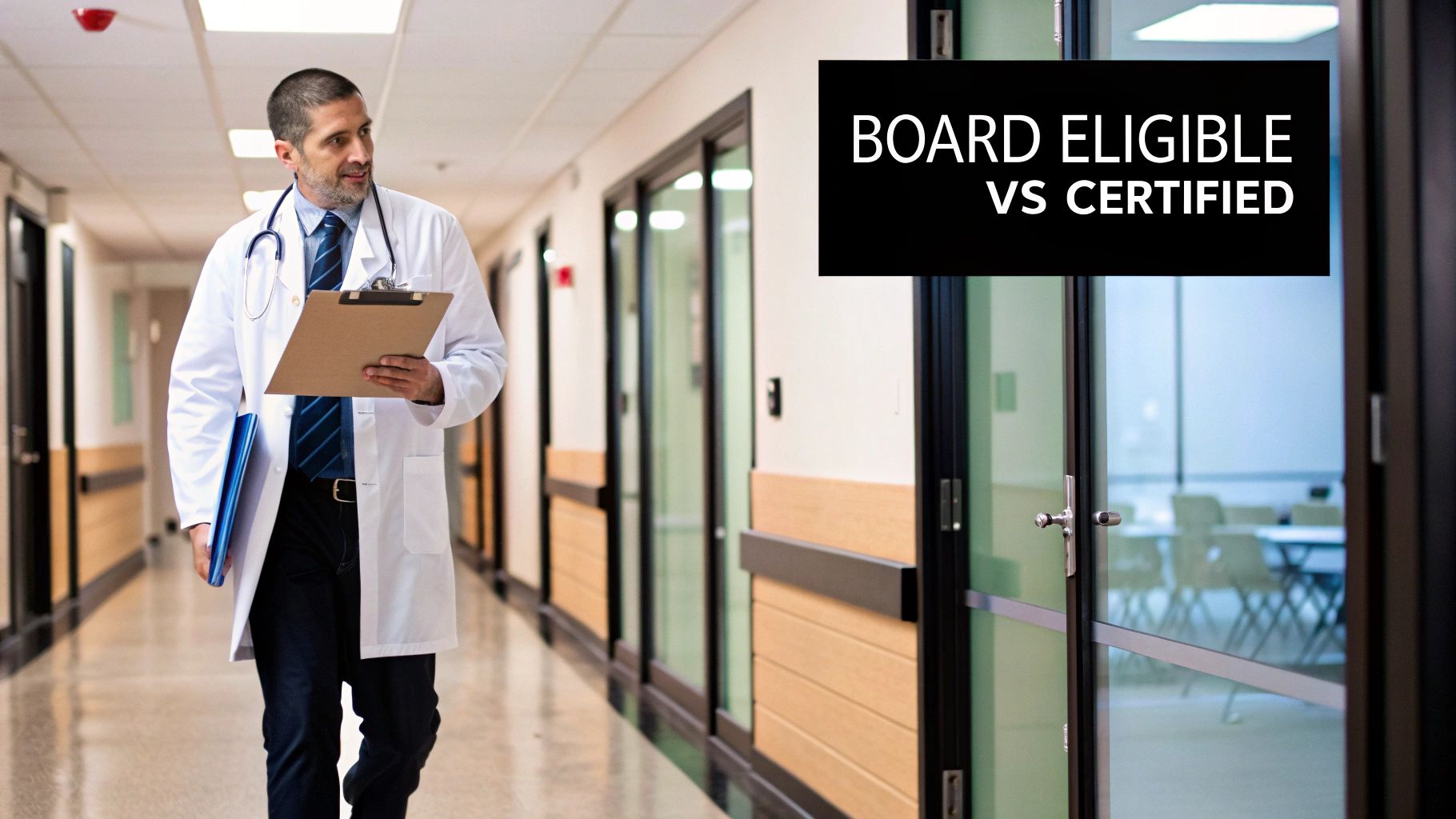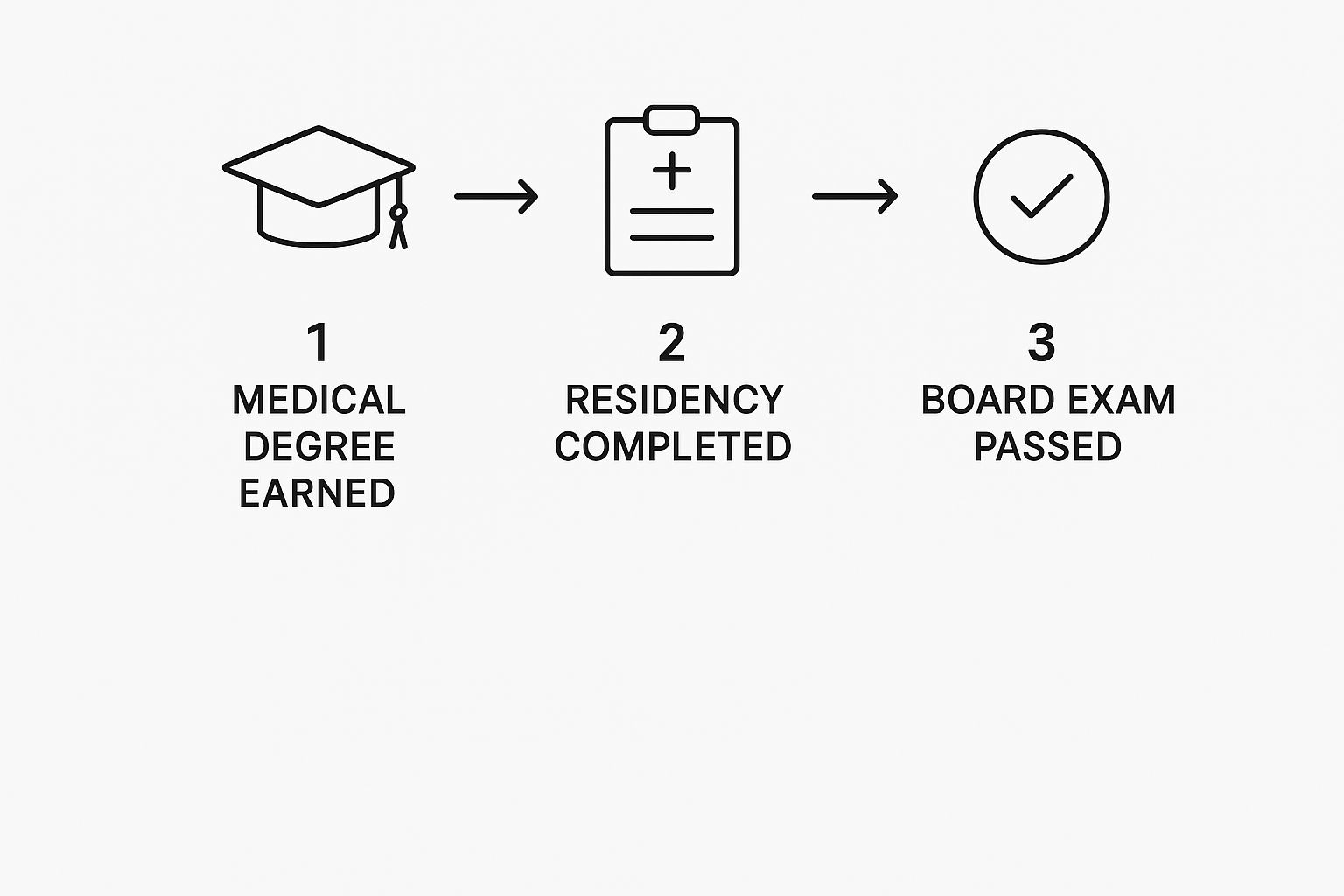
February 3, 2026
Restylane Kysse Vs Juvederm A Complete Lip Filler Comparison
Choosing between Restylane Kysse vs Juvederm? Our guide compares feel, longevity, and results to help you find the perfect lip filler for your aesthetic goals.
Sep 9, 2025

When you're trying to understand a surgeon's qualifications, it can feel like you're learning a new language. But two terms are absolutely critical for your safety and peace of mind: board eligible and board certified.
Simply put, a board eligible surgeon has finished their demanding residency training but hasn't yet passed the final, rigorous exams for their specialty. In contrast, a board certified surgeon has not only completed that same training but has also passed both the written and oral board exams, officially proving their expertise.

The gap between these two credentials isn't just a matter of wording—it's the final, validating chapter in a surgeon's long journey to becoming a proven expert.
Think of it this way: a law school graduate is fully trained, but they aren't a licensed attorney until they pass the bar exam. Board certification is the medical world’s version of passing the bar. It’s an independent, objective confirmation that a surgeon meets the highest national standards for skill and knowledge in their specific field.
This isn't a rubber stamp from their training hospital. This verification comes from an independent national board, ensuring the surgeon has not only put in the years of hands-on residency but has also demonstrated true mastery under intense scrutiny.
To put it all into perspective, let's break down exactly what each credential means for a surgeon’s qualifications. The key difference really comes down to that final, crucial step of passing the board exams.
Looking at this, it's clear that while being board eligible is a significant step, board certification is what solidifies a surgeon's standing as a specialist.
A board eligible status is a milestone, but board certification is the destination. It’s the ultimate proof that a surgeon has subjected their skills to peer review against a demanding national standard, offering patients a greater level of assurance.
Becoming a board-certified plastic surgeon is the culmination of more than a decade of intense, dedicated medical training. The journey starts with a medical degree, but that's just the prerequisite. Think of it as the foundation upon which years of specialized, hands-on surgical skill are built.
After medical school, the real work begins with a plastic surgery residency. This is a multi-year, immersive apprenticeship where surgeons live and breathe their craft. They spend countless hours in the operating room, logging hundreds of complex surgical cases under the watchful eyes of senior mentors who critique everything—their technical precision, clinical judgment, and professional ethics. Only after successfully completing this exhaustive training are they allowed to call themselves board eligible.
This entire process is carefully structured, ensuring every surgeon builds a deep well of knowledge before they ever specialize.

As you can see, passing the board exam is that final, critical step that transforms a highly trained surgeon into a validated expert.
Earning the "board eligible" status is a massive achievement, but it's not the finish line. The final hurdle is a series of grueling examinations designed to test a surgeon's competence under the highest possible pressure. These aren't just any tests; they're multi-day assessments administered by an independent specialty board, completely separate from the surgeon's own training institution.
The exams are typically broken into two demanding parts:
This final stage is about much more than just reciting facts from a textbook. It's designed to evaluate a surgeon’s critical thinking, their ability to manage a crisis, and how well they can apply years of training when it matters most. It's the ultimate confirmation that they meet the absolute highest standards of patient care.
Passing these exams is what officially closes the gap between board eligible vs board certified, cementing certification as the true gold standard in the field.
When you're trying to understand the difference between a board-eligible and a board-certified surgeon, it really boils down to one thing: proven, tested expertise. While both types of surgeons have finished a demanding residency program, only one has gone the extra mile to pass the rigorous final exams administered by their specialty board.
Think of it this way: board certification isn't just another test. It’s an objective, third-party validation of a surgeon's skills and judgment, confirming they can handle complex situations and make sound decisions when it matters most. Plus, it’s not a one-and-done deal. To stay certified, they have to commit to ongoing education and periodic re-examinations, which keeps their knowledge current.
This distinction becomes even more critical in highly specialized fields like plastic surgery. The path to board certification often requires a surgeon to demonstrate mastery of the latest techniques and technologies. For example, a deep understanding of advanced imaging-guided surgery is often a key part of modern surgical training and evaluation.
A board-eligible surgeon is on the path and is presumed to have this knowledge from their training. A board-certified surgeon, on the other hand, has had that knowledge officially tested and verified by independent experts in their field.
Choosing a board-certified surgeon means you're picking a professional who has voluntarily put their skills and knowledge up for review against a tough national standard. It's a clear, objective measure of their competence and a public promise to keep learning throughout their career.
The medical community overwhelmingly recognizes the importance of this credential. As of June 30, 2021, there were roughly 949,928 physicians in the United States holding active board certification across 40 different specialties. You can dig into the specifics in the full ABMS Board Certification Report.
This number shows just how vital this standard is. While a board-eligible surgeon is certainly well-trained, a board-certified surgeon offers an added layer of accountability and a demonstrated commitment to excellence—something that can provide significant peace of mind when your health is in their hands.
When you’re weighing board eligible vs board certified surgeons, it’s not just about semantics—this distinction has a direct impact on your safety and the quality of your results. Opting for a board-certified surgeon means choosing someone whose commitment goes far beyond passing a single test. It's a career-long promise to uphold the absolute highest standards in medical care and knowledge.
This dedication is formalized through a rigorous program called Maintenance of Certification (MOC). MOC isn't optional; it requires surgeons to consistently engage in continuing education. They must stay on top of the latest medical breakthroughs, surgical techniques, and critical safety protocols. This isn’t just about passive learning; it's about actively proving their expertise remains sharp, year after year.

This kind of continuous training is what prepares a surgeon to handle unexpected complications if they come up during a procedure. While every surgery has some level of risk, a board-certified surgeon brings an invaluable layer of protection rooted in deep, current knowledge. Their ability to think on their feet and respond effectively in a critical moment is something honed by this demanding process.
To understand more about this, you can explore the cosmetic surgery safety statistics in our detailed guide.
Choosing a board-certified surgeon ensures your care is in the hands of a professional who has not only proven their expertise at the highest level but has also pledged to maintain that standard for their entire career.
At the end of the day, this entire system of ongoing validation exists for one reason: patient safety. It gives you real assurance that your surgeon is accountable, exceptionally skilled, and ready to provide the best possible care, which directly shapes your final outcome and your peace of mind.
For a surgeon, board certification isn't just about giving patients peace of mind. It’s a fundamental credential that can make or break a career. Think of it less as an extra line on a resume and more as the industry-wide standard that opens critical professional doors.
Most highly-regarded hospitals and surgical centers, for instance, demand board certification before they will grant hospital privileges. Without these privileges, a surgeon simply can't perform procedures in their facilities, severely limiting where and how they can practice.
This standard echoes across other essential parts of a surgeon's career. Malpractice insurance providers often see board certification as a direct reflection of a surgeon's competence and commitment to safety, which can significantly impact their ability to get coverage and how much they pay for it.
Hiring organizations and top-tier practice groups also treat board certification as a must-have benchmark for quality. A surgeon without it will find their job prospects are much more limited and may be shut out of premier roles. You can find more details about these hiring standards for physicians on phg.com.
Surgeons who remain "board eligible" long-term face significant professional roadblocks. The healthcare system itself—from hospitals to insurers—views full certification as the definitive measure of a surgeon’s expertise and commitment to excellence.
This is why the most trusted and respected surgeons are almost always board certified. When you're weighing the difference between board eligible vs board certified, knowing about these professional hurdles should give you extra confidence in your choice. This is an important piece of the puzzle when learning how to choose the right plastic surgeon for your goals, as it confirms the credential is a true standard of excellence demanded by the medical community itself.
It's one thing for a surgeon's website to list their qualifications; it's another to verify them yourself. Taking a few minutes to check a surgeon's credentials is the single best way to ensure they've met the rigorous standards required for plastic surgery. Thankfully, it's a simple, free process.
The gold standard for this is the American Board of Medical Specialties (ABMS) "Certification Matters" website. This is the official database, so you're getting information straight from the source, cutting through any marketing fluff.
You can find the search tool right on their homepage. Just type in the surgeon's name and location to see their official standing.

This free search instantly tells you if a surgeon is board certified, in what specific field, and whether their certification is currently active.
When you look at the results, you're checking for two critical pieces of information:
This simple verification step is one of the most powerful actions you can take. It replaces uncertainty with confidence, ensuring your choice is based on proven, peer-reviewed expertise.
Doing your own due diligence is a vital part of the journey. For a deeper dive, you can learn more about how to research plastic surgeons in our comprehensive guide. This step empowers you to make a truly informed decision for your safety and results.
Trying to make sense of a surgeon's credentials can feel a bit overwhelming, but it's one of the most important steps you can take. Getting clear on these details is key to making a choice you feel great about. Here are straightforward answers to the questions we hear most often from patients comparing board eligible vs. board certified surgeons.
Of course. A surgeon who is "board eligible" has completed an incredibly demanding residency program, which is no small feat. They’ve put in the years and have plenty of hands-on skill.
The key difference is that they haven't yet taken—and passed—the rigorous final exams that measure their expertise against the highest national standards. Think of it this way: while many are highly competent, board certification is that final, objective seal of approval. It’s an extra layer of peace of mind for you.
Board eligibility shows a surgeon has finished the required training. Board certification proves they've mastered it.
Yes, and this is a critical detail. Medical boards, like the American Board of Family Medicine, don't let the "board eligible" status last forever. A surgeon typically has a window of five to seven years after finishing their residency to pass the exams.
If they don't achieve certification within that timeframe, they can no longer call themselves board eligible. This system ensures that the designation is just a temporary step on the path to full certification, not a permanent credential.
No certification can promise a perfect result—every surgery has its own set of risks. But choosing a board-certified surgeon is one of the best ways to stack the odds in your favor for a safe and successful procedure.
It's your confirmation that the surgeon has met the most stringent national standards for knowledge, skill, and ethical practice in their specific field.
They are not. For a certification to carry real weight, it should come from a board recognized by the American Board of Medical Specialties (ABMS). Be aware that some organizations offer "certifications" that don't require the same level of rigorous testing and evaluation. Always double-check that a surgeon’s board certification is from a legitimate, ABMS-member board. It’s the gold standard.
At Cape Cod Plastic Surgery, Dr. Fater is a board-certified plastic surgeon dedicated to the highest standard of patient care and safety. To learn more or to schedule a consultation, please visit us at https://ccplasticsurgery.com.

February 3, 2026
Choosing between Restylane Kysse vs Juvederm? Our guide compares feel, longevity, and results to help you find the perfect lip filler for your aesthetic goals.

February 3, 2026
Transformative Journeys: Personal Stories of Change and Healing

February 2, 2026
Explore liposuction and mini tummy tuck to see if it fits your goals. Learn procedure details, recovery time, risks, and the realistic outcomes.